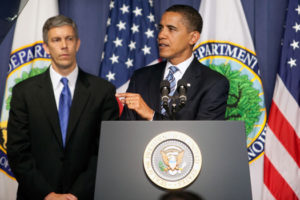
More than 13 million students and 1 million educators will share $3.4 billion from the second round of the federal “Race to the Top” grant competition, the U.S. Education Department (ED) said on Aug. 24.
The department chose nine states–Florida, Georgia, Hawaii, Massachusetts, Maryland, New York, North Carolina, Ohio, and Rhode Island–and the District of Columbia for the grants. Education Secretary Arne Duncan said 25,000 schools will get money to raise student learning and close the achievement gap.
The Race to the Top program, part of President Barack Obama’s economic stimulus plan, rewards states for taking up ambitious changes to improve struggling schools. The competition instigated a wave of reforms across the country, as states passed new teacher accountability policies and lifted caps on charter schools to boost their chances of winning.
“These states show what is possible when adults come together to do the right thing for children,” Duncan said in a conference call with reporters. “Every state that applied showed a tremendous amount of leadership and a bold commitment to education reform. The creativity and innovation in each of these applications is breathtaking.”
In the first round of the contest in the spring, just two states were winners–Tennessee and Delaware–and they scored more than 440 out of a possible 500 points. In this round, Duncan said all 10 winners scored more than 440 points, showing improvement in the applications.
He said the department wanted to choose more winners but “simply ran out of money.”
For the winners, the grants mean a cash infusion at a time when education funding is dwindling, forcing teacher layoffs and program reductions. The awards range from $75 million for Rhode Island and D.C. to $700 million for New York.
“While this has seemed more like a marathon at times, now the real race begins,” said Georgia Gov. Sonny Perdue, whose state is getting $400 million. “This is truly a unique opportunity to implement a Georgia-created plan that will accelerate our work in improving student achievement.”
Georgia came in third in the first round of the $4.35 billion competition in March, losing out to Tennessee and Delaware, which are sharing $600 million. Thirty-five states and the District of Columbia applied for the second round of the competition, and ED named 19 finalists in July.
The applicants named winners on Aug. 24 will share $3.4 billion. Another $350 million is coming in a separate competition for states creating new academic assessments.
One notable absence on the list of winners was Colorado, which passed a controversial law this year that ties teacher pay to student performance and allows the state to strip tenure from low-performing instructors.
The chairman of the state Board of Education, Bob Schaffer, said the reforms weren’t contingent on Colorado’s application for a $175 million grant.
“The outcome has little bearing on good education in Colorado,” Schaffer said. “As a state, we are perfectly capable of meeting the needs of our public education system. Federal funds come with strings and request. On balance, there is as much to gain as there is to lose by taking these federal funds.”
Like Colorado, at least 17 states vying for the money reformed teacher evaluation systems to include student achievement, and more than a dozen changed laws to foster the growth of charter schools. Dozens also adopted Common Core State Standards, the uniform math and reading benchmarks developed by the Council of Chief State School Officers and the National Governors Association.
“The change unleashed by conditioning federal funding on bold and forward-looking state education policies is indisputable,” the Democrats for Education Reform said in a statement. “Under the president’s leadership, local civil rights, child advocacy, business and education reform groups, in collaboration with those state and local teacher unions ready for change, sprung into action to achieve things that they had been waiting and wanting to do for years.”
In a speech announcing the finalists last month, Duncan called the change a “quiet revolution.”
“This is not about funding a few states on a pilot basis. This is about a national movement,” he said.
But some education groups said Race to the Top rewarded states that have weak reform efforts while leaving out those like Colorado and Louisiana that have made strides to overhaul their schools.
“It becomes clear that the vagaries of peer reviewers and the prowess of grant writers are what drive results in such competitions, not true policy change, political courage, leadership or public commitment to reform,” said Mike Petrilli, a former ED official who is now vice president at the Fordham Institute.
Between both rounds of the competition, 46 states and the District of Columbia applied.
The competition for many states was an uphill battle, with teacher unions hesitant to sign on to reforms directly tying teacher evaluations to student performance on standardized tests, and education leaders concerned winning meant giving up too much local control.
Florida was among the states that got resistance from many teachers unions in the first round of the competition but won their support after taking a more collaborative approach in round two.
“I think it shows that when the governor brought all the stakeholders together, we came up with an application that was strong and doable,” said Andy Ford, president of the Florida Education Association, the statewide teachers’ union.
Other states, like Indiana, dropped out of the competition because of the lack of union support for the state’s application.
Some states that did not win the competition said they still planned to proceed with the reforms they had proposed, though they acknowledged change would take place at a slower pace without the financial boost of Race to the Top.
- ‘Buyer’s remorse’ dogging Common Core rollout - October 30, 2014
- Calif. law targets social media monitoring of students - October 2, 2014
- Elementary world language instruction - September 25, 2014


Comments are closed.